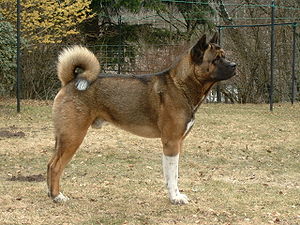- Great Japanese Dog
-
American Akita FCI-Standard Nr. 344 - Gruppe 5: Spitze und Hunde vom Urtyp
- Sektion 5: Asiatische Spitze und verwandte Rassen
- Ohne Arbeitsprüfung
Ursprung: Japan
Entwicklung der Rasse in den Vereinigten Staaten.Alternative Namen: Great Japanese Dog, Großer Japanischer Hund
Widerristhöhe: Rüden: 66–71 cm
Hündin: 61–66 cmGewicht: 35–55 kg
Liste der Haushunde Der American Akita (vormals Great Japanese Dog) ist eine von der FCI (Nr. 344, Gr. 5, Sek. 5) anerkannte Hunderasse aus Japan.
Herkunft und Geschichtliches
Der japanische Akita Inu und der American Akita bzw. der Great Japanese Dog waren bis nach dem Zweiten Weltkrieg eine gemeinsame Rasse. Ab 1956 wurde ein Zweig in den USA weiter gezüchtet. Japan erkannte diese Linie allerdings nicht an, so dass es zu keinem Austausch kam. Infolgedessen entwickelten sich die beiden Linien auseinander. 1996 wurde der Situation durch eine Rasseteilung der FCI Rechnung getragen. Seit dem Jahr 2000 gibt es diese zwei Erscheinungsformen.
Beschreibung
Der American Akita ist ein bis 71 cm großer Hund, stockhaarig mit kürzerer, reichlicher Unterwolle. Alle Farben sind zugelassen, einschließlich gestromt oder gescheckt; die Farben sollten allerdings klar voneinander abgesetzt sein. Obwohl das Spitzerbe kaum erkennbar ist, zeigen doch die Ohren die Herkunft: sie sind straff stehend, nach vorne gerichtet, dreieckig und klein. Die Rute wird auf dem Rücken oder angelehnt an die Seite zusammengerollt getragen, sie ist dick behaart.
Weblinks
- Rassestandard Nr. 344 der FCI: American Akita (Worddokument)
Wikimedia Foundation.

